Leadership, Management, and Operations at Corus Group: A Report
VerifiedAdded on 2021/02/19
|16
|5158
|18
Report
AI Summary
This report provides a comprehensive analysis of leadership and management practices within the Corus Group, a UK and Netherlands-based steel manufacturing company. The report begins by defining and comparing the roles of leaders and managers, highlighting their similarities and differences in the context of organizational goals. It then evaluates various management and leadership roles in different organizational scenarios, such as the introduction of new technology and the enhancement of employee engagement. The study further assesses the roles and functions of leaders and managers in conflict resolution and employee engagement, emphasizing the importance of these factors for business growth. Different approaches to operational management, including situational leadership, are examined to improve overall business productivity. The report concludes with recommendations for future improvements within Corus Group, focusing on operational efficiency and strategic decision-making. The analysis leverages various academic sources and industry insights to provide a practical understanding of leadership and management within a real-world business context. The report offers a valuable insight into the practical application of leadership and management theories within a real-world business environment.
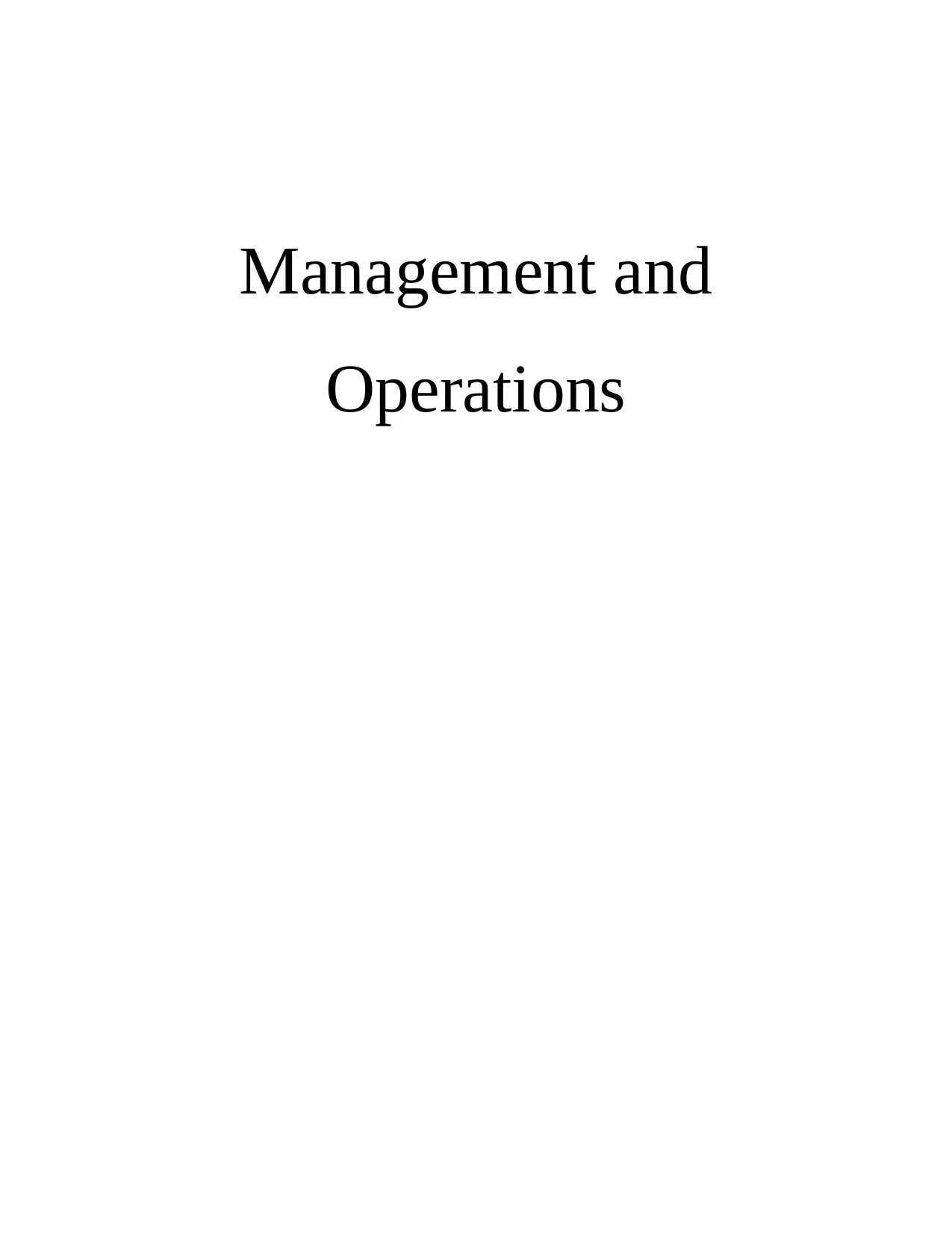
Management and
Operations
Operations
Paraphrase This Document
Need a fresh take? Get an instant paraphrase of this document with our AI Paraphraser
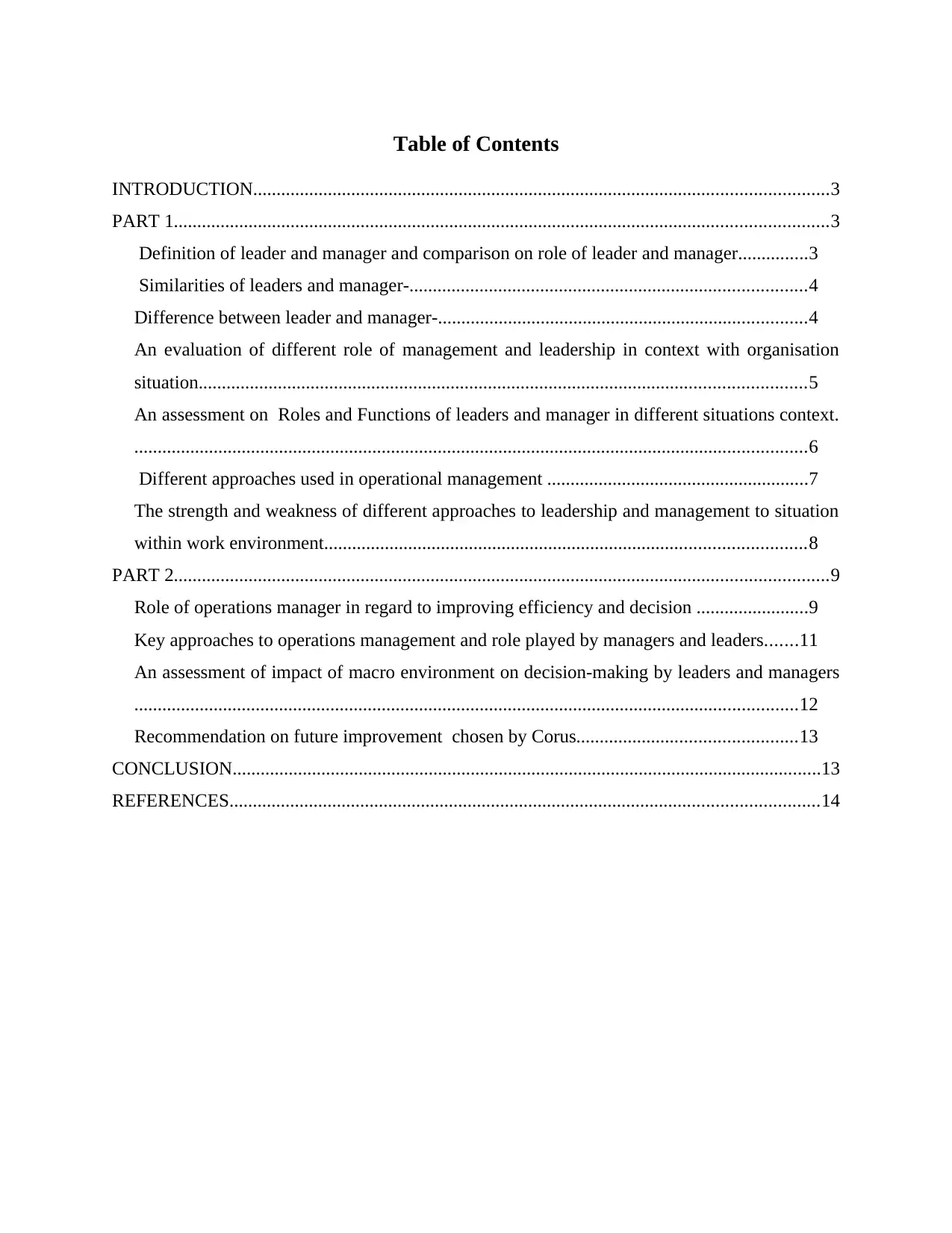
Table of Contents
INTRODUCTION...........................................................................................................................3
PART 1............................................................................................................................................3
Definition of leader and manager and comparison on role of leader and manager...............3
Similarities of leaders and manager-.....................................................................................4
Difference between leader and manager-...............................................................................4
An evaluation of different role of management and leadership in context with organisation
situation..................................................................................................................................5
An assessment on Roles and Functions of leaders and manager in different situations context.
................................................................................................................................................6
Different approaches used in operational management ........................................................7
The strength and weakness of different approaches to leadership and management to situation
within work environment.......................................................................................................8
PART 2............................................................................................................................................9
Role of operations manager in regard to improving efficiency and decision ........................9
Key approaches to operations management and role played by managers and leaders.......11
An assessment of impact of macro environment on decision-making by leaders and managers
..............................................................................................................................................12
Recommendation on future improvement chosen by Corus...............................................13
CONCLUSION..............................................................................................................................13
REFERENCES..............................................................................................................................14
INTRODUCTION...........................................................................................................................3
PART 1............................................................................................................................................3
Definition of leader and manager and comparison on role of leader and manager...............3
Similarities of leaders and manager-.....................................................................................4
Difference between leader and manager-...............................................................................4
An evaluation of different role of management and leadership in context with organisation
situation..................................................................................................................................5
An assessment on Roles and Functions of leaders and manager in different situations context.
................................................................................................................................................6
Different approaches used in operational management ........................................................7
The strength and weakness of different approaches to leadership and management to situation
within work environment.......................................................................................................8
PART 2............................................................................................................................................9
Role of operations manager in regard to improving efficiency and decision ........................9
Key approaches to operations management and role played by managers and leaders.......11
An assessment of impact of macro environment on decision-making by leaders and managers
..............................................................................................................................................12
Recommendation on future improvement chosen by Corus...............................................13
CONCLUSION..............................................................................................................................13
REFERENCES..............................................................................................................................14
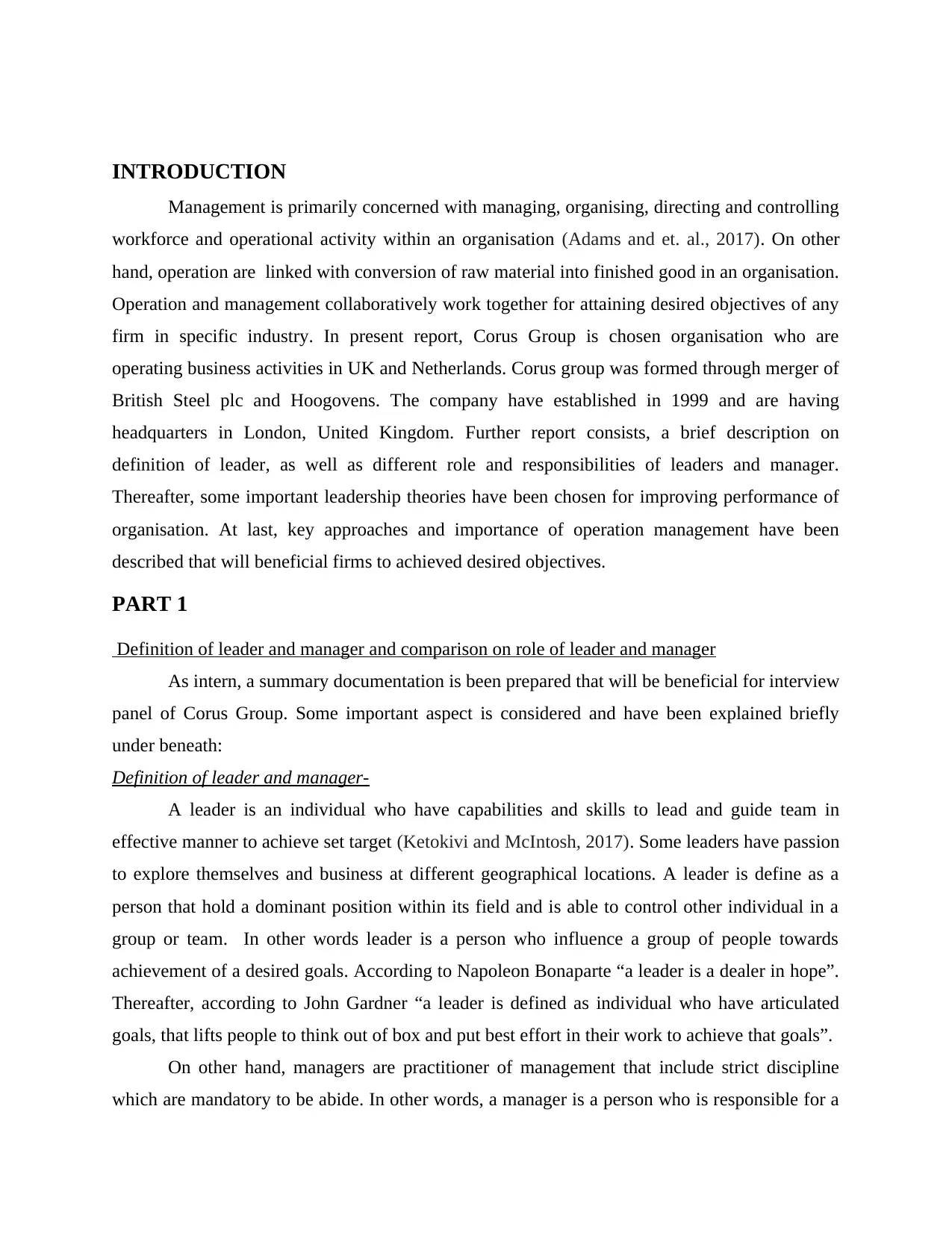
INTRODUCTION
Management is primarily concerned with managing, organising, directing and controlling
workforce and operational activity within an organisation (Adams and et. al., 2017). On other
hand, operation are linked with conversion of raw material into finished good in an organisation.
Operation and management collaboratively work together for attaining desired objectives of any
firm in specific industry. In present report, Corus Group is chosen organisation who are
operating business activities in UK and Netherlands. Corus group was formed through merger of
British Steel plc and Hoogovens. The company have established in 1999 and are having
headquarters in London, United Kingdom. Further report consists, a brief description on
definition of leader, as well as different role and responsibilities of leaders and manager.
Thereafter, some important leadership theories have been chosen for improving performance of
organisation. At last, key approaches and importance of operation management have been
described that will beneficial firms to achieved desired objectives.
PART 1
Definition of leader and manager and comparison on role of leader and manager
As intern, a summary documentation is been prepared that will be beneficial for interview
panel of Corus Group. Some important aspect is considered and have been explained briefly
under beneath:
Definition of leader and manager-
A leader is an individual who have capabilities and skills to lead and guide team in
effective manner to achieve set target (Ketokivi and McIntosh, 2017). Some leaders have passion
to explore themselves and business at different geographical locations. A leader is define as a
person that hold a dominant position within its field and is able to control other individual in a
group or team. In other words leader is a person who influence a group of people towards
achievement of a desired goals. According to Napoleon Bonaparte “a leader is a dealer in hope”.
Thereafter, according to John Gardner “a leader is defined as individual who have articulated
goals, that lifts people to think out of box and put best effort in their work to achieve that goals”.
On other hand, managers are practitioner of management that include strict discipline
which are mandatory to be abide. In other words, a manager is a person who is responsible for a
Management is primarily concerned with managing, organising, directing and controlling
workforce and operational activity within an organisation (Adams and et. al., 2017). On other
hand, operation are linked with conversion of raw material into finished good in an organisation.
Operation and management collaboratively work together for attaining desired objectives of any
firm in specific industry. In present report, Corus Group is chosen organisation who are
operating business activities in UK and Netherlands. Corus group was formed through merger of
British Steel plc and Hoogovens. The company have established in 1999 and are having
headquarters in London, United Kingdom. Further report consists, a brief description on
definition of leader, as well as different role and responsibilities of leaders and manager.
Thereafter, some important leadership theories have been chosen for improving performance of
organisation. At last, key approaches and importance of operation management have been
described that will beneficial firms to achieved desired objectives.
PART 1
Definition of leader and manager and comparison on role of leader and manager
As intern, a summary documentation is been prepared that will be beneficial for interview
panel of Corus Group. Some important aspect is considered and have been explained briefly
under beneath:
Definition of leader and manager-
A leader is an individual who have capabilities and skills to lead and guide team in
effective manner to achieve set target (Ketokivi and McIntosh, 2017). Some leaders have passion
to explore themselves and business at different geographical locations. A leader is define as a
person that hold a dominant position within its field and is able to control other individual in a
group or team. In other words leader is a person who influence a group of people towards
achievement of a desired goals. According to Napoleon Bonaparte “a leader is a dealer in hope”.
Thereafter, according to John Gardner “a leader is defined as individual who have articulated
goals, that lifts people to think out of box and put best effort in their work to achieve that goals”.
On other hand, managers are practitioner of management that include strict discipline
which are mandatory to be abide. In other words, a manager is a person who is responsible for a
⊘ This is a preview!⊘
Do you want full access?
Subscribe today to unlock all pages.

Trusted by 1+ million students worldwide
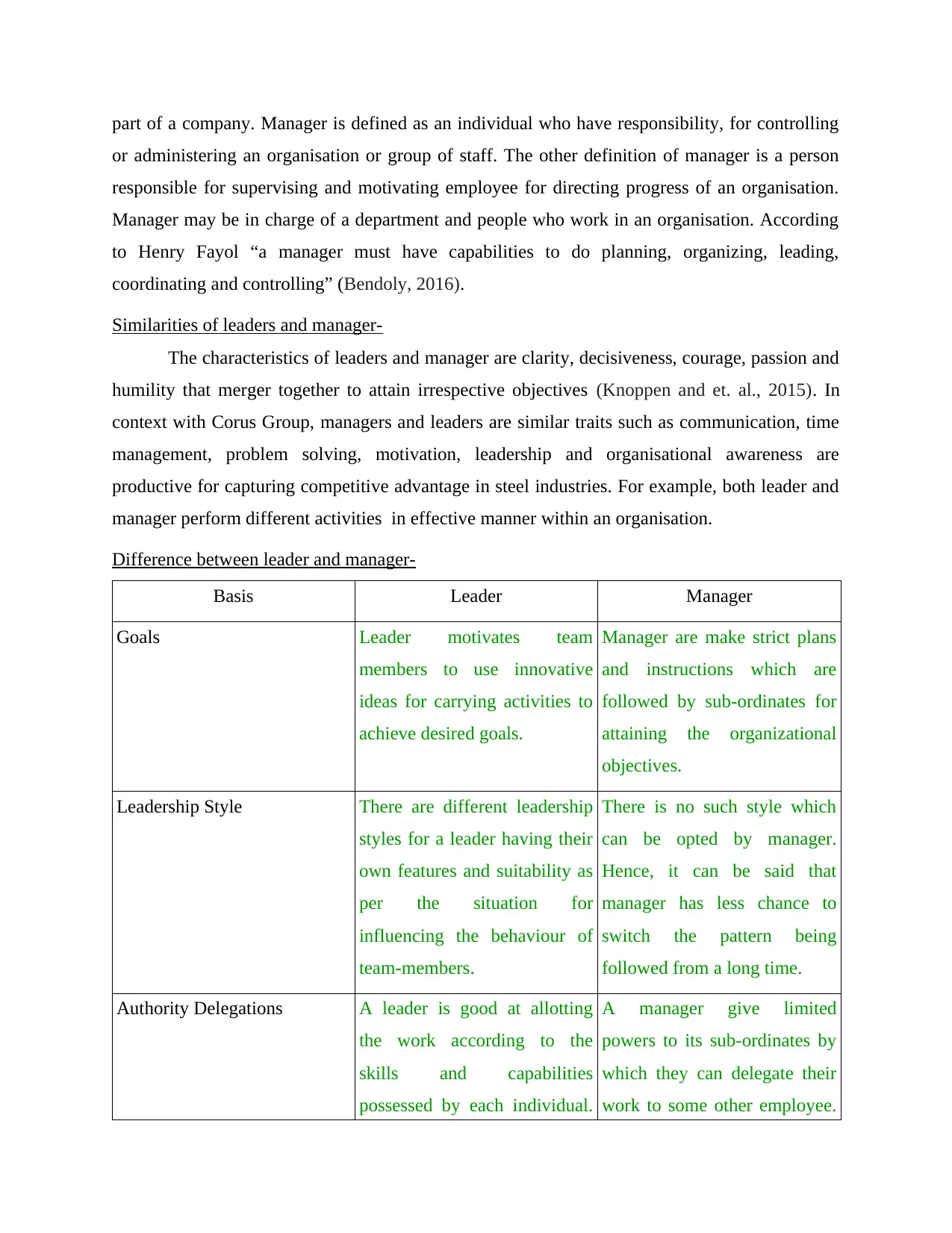
part of a company. Manager is defined as an individual who have responsibility, for controlling
or administering an organisation or group of staff. The other definition of manager is a person
responsible for supervising and motivating employee for directing progress of an organisation.
Manager may be in charge of a department and people who work in an organisation. According
to Henry Fayol “a manager must have capabilities to do planning, organizing, leading,
coordinating and controlling” (Bendoly, 2016).
Similarities of leaders and manager-
The characteristics of leaders and manager are clarity, decisiveness, courage, passion and
humility that merger together to attain irrespective objectives (Knoppen and et. al., 2015). In
context with Corus Group, managers and leaders are similar traits such as communication, time
management, problem solving, motivation, leadership and organisational awareness are
productive for capturing competitive advantage in steel industries. For example, both leader and
manager perform different activities in effective manner within an organisation.
Difference between leader and manager-
Basis Leader Manager
Goals Leader motivates team
members to use innovative
ideas for carrying activities to
achieve desired goals.
Manager are make strict plans
and instructions which are
followed by sub-ordinates for
attaining the organizational
objectives.
Leadership Style There are different leadership
styles for a leader having their
own features and suitability as
per the situation for
influencing the behaviour of
team-members.
There is no such style which
can be opted by manager.
Hence, it can be said that
manager has less chance to
switch the pattern being
followed from a long time.
Authority Delegations A leader is good at allotting
the work according to the
skills and capabilities
possessed by each individual.
A manager give limited
powers to its sub-ordinates by
which they can delegate their
work to some other employee.
or administering an organisation or group of staff. The other definition of manager is a person
responsible for supervising and motivating employee for directing progress of an organisation.
Manager may be in charge of a department and people who work in an organisation. According
to Henry Fayol “a manager must have capabilities to do planning, organizing, leading,
coordinating and controlling” (Bendoly, 2016).
Similarities of leaders and manager-
The characteristics of leaders and manager are clarity, decisiveness, courage, passion and
humility that merger together to attain irrespective objectives (Knoppen and et. al., 2015). In
context with Corus Group, managers and leaders are similar traits such as communication, time
management, problem solving, motivation, leadership and organisational awareness are
productive for capturing competitive advantage in steel industries. For example, both leader and
manager perform different activities in effective manner within an organisation.
Difference between leader and manager-
Basis Leader Manager
Goals Leader motivates team
members to use innovative
ideas for carrying activities to
achieve desired goals.
Manager are make strict plans
and instructions which are
followed by sub-ordinates for
attaining the organizational
objectives.
Leadership Style There are different leadership
styles for a leader having their
own features and suitability as
per the situation for
influencing the behaviour of
team-members.
There is no such style which
can be opted by manager.
Hence, it can be said that
manager has less chance to
switch the pattern being
followed from a long time.
Authority Delegations A leader is good at allotting
the work according to the
skills and capabilities
possessed by each individual.
A manager give limited
powers to its sub-ordinates by
which they can delegate their
work to some other employee.
Paraphrase This Document
Need a fresh take? Get an instant paraphrase of this document with our AI Paraphraser
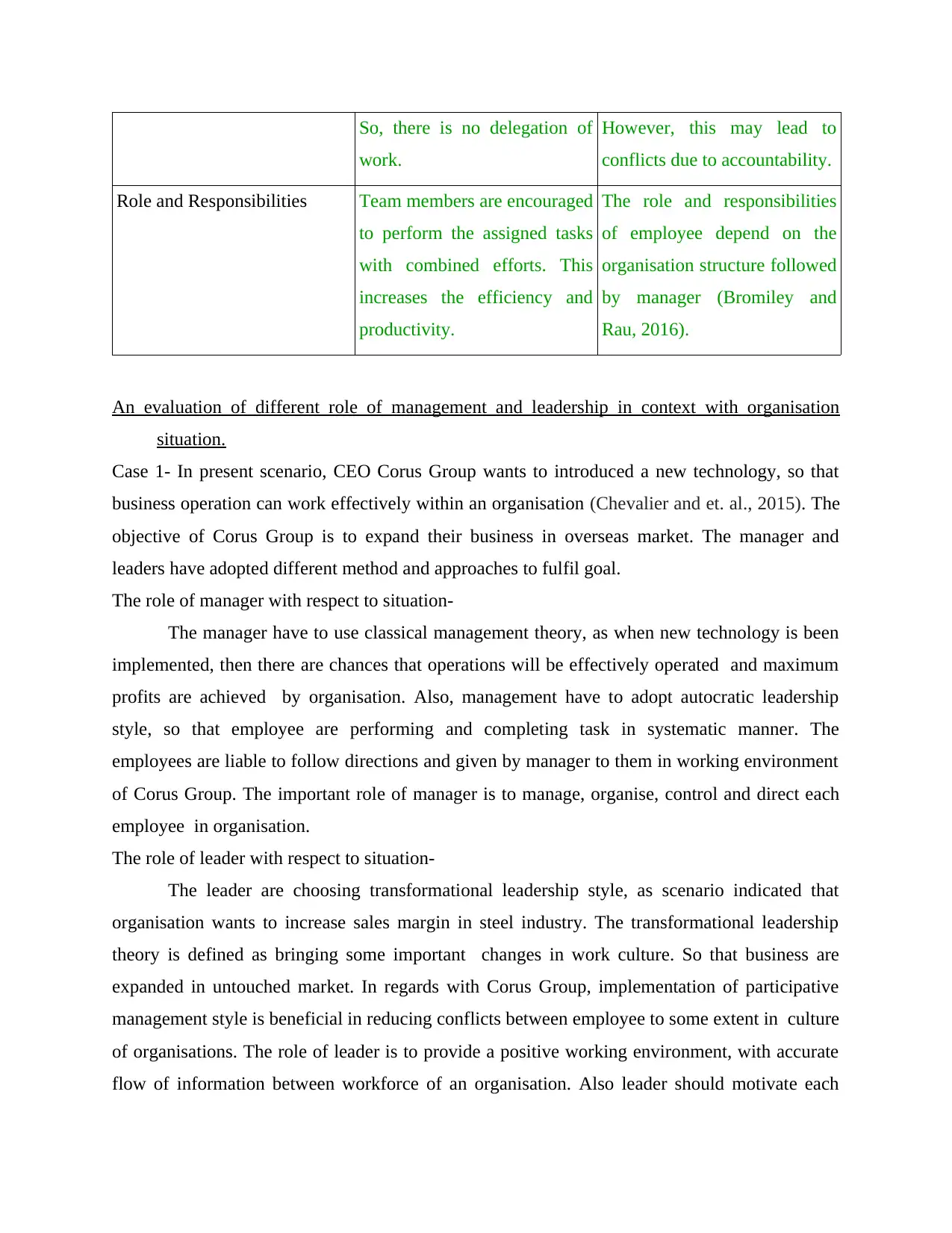
So, there is no delegation of
work.
However, this may lead to
conflicts due to accountability.
Role and Responsibilities Team members are encouraged
to perform the assigned tasks
with combined efforts. This
increases the efficiency and
productivity.
The role and responsibilities
of employee depend on the
organisation structure followed
by manager (Bromiley and
Rau, 2016).
An evaluation of different role of management and leadership in context with organisation
situation.
Case 1- In present scenario, CEO Corus Group wants to introduced a new technology, so that
business operation can work effectively within an organisation (Chevalier and et. al., 2015). The
objective of Corus Group is to expand their business in overseas market. The manager and
leaders have adopted different method and approaches to fulfil goal.
The role of manager with respect to situation-
The manager have to use classical management theory, as when new technology is been
implemented, then there are chances that operations will be effectively operated and maximum
profits are achieved by organisation. Also, management have to adopt autocratic leadership
style, so that employee are performing and completing task in systematic manner. The
employees are liable to follow directions and given by manager to them in working environment
of Corus Group. The important role of manager is to manage, organise, control and direct each
employee in organisation.
The role of leader with respect to situation-
The leader are choosing transformational leadership style, as scenario indicated that
organisation wants to increase sales margin in steel industry. The transformational leadership
theory is defined as bringing some important changes in work culture. So that business are
expanded in untouched market. In regards with Corus Group, implementation of participative
management style is beneficial in reducing conflicts between employee to some extent in culture
of organisations. The role of leader is to provide a positive working environment, with accurate
flow of information between workforce of an organisation. Also leader should motivate each
work.
However, this may lead to
conflicts due to accountability.
Role and Responsibilities Team members are encouraged
to perform the assigned tasks
with combined efforts. This
increases the efficiency and
productivity.
The role and responsibilities
of employee depend on the
organisation structure followed
by manager (Bromiley and
Rau, 2016).
An evaluation of different role of management and leadership in context with organisation
situation.
Case 1- In present scenario, CEO Corus Group wants to introduced a new technology, so that
business operation can work effectively within an organisation (Chevalier and et. al., 2015). The
objective of Corus Group is to expand their business in overseas market. The manager and
leaders have adopted different method and approaches to fulfil goal.
The role of manager with respect to situation-
The manager have to use classical management theory, as when new technology is been
implemented, then there are chances that operations will be effectively operated and maximum
profits are achieved by organisation. Also, management have to adopt autocratic leadership
style, so that employee are performing and completing task in systematic manner. The
employees are liable to follow directions and given by manager to them in working environment
of Corus Group. The important role of manager is to manage, organise, control and direct each
employee in organisation.
The role of leader with respect to situation-
The leader are choosing transformational leadership style, as scenario indicated that
organisation wants to increase sales margin in steel industry. The transformational leadership
theory is defined as bringing some important changes in work culture. So that business are
expanded in untouched market. In regards with Corus Group, implementation of participative
management style is beneficial in reducing conflicts between employee to some extent in culture
of organisations. The role of leader is to provide a positive working environment, with accurate
flow of information between workforce of an organisation. Also leader should motivate each
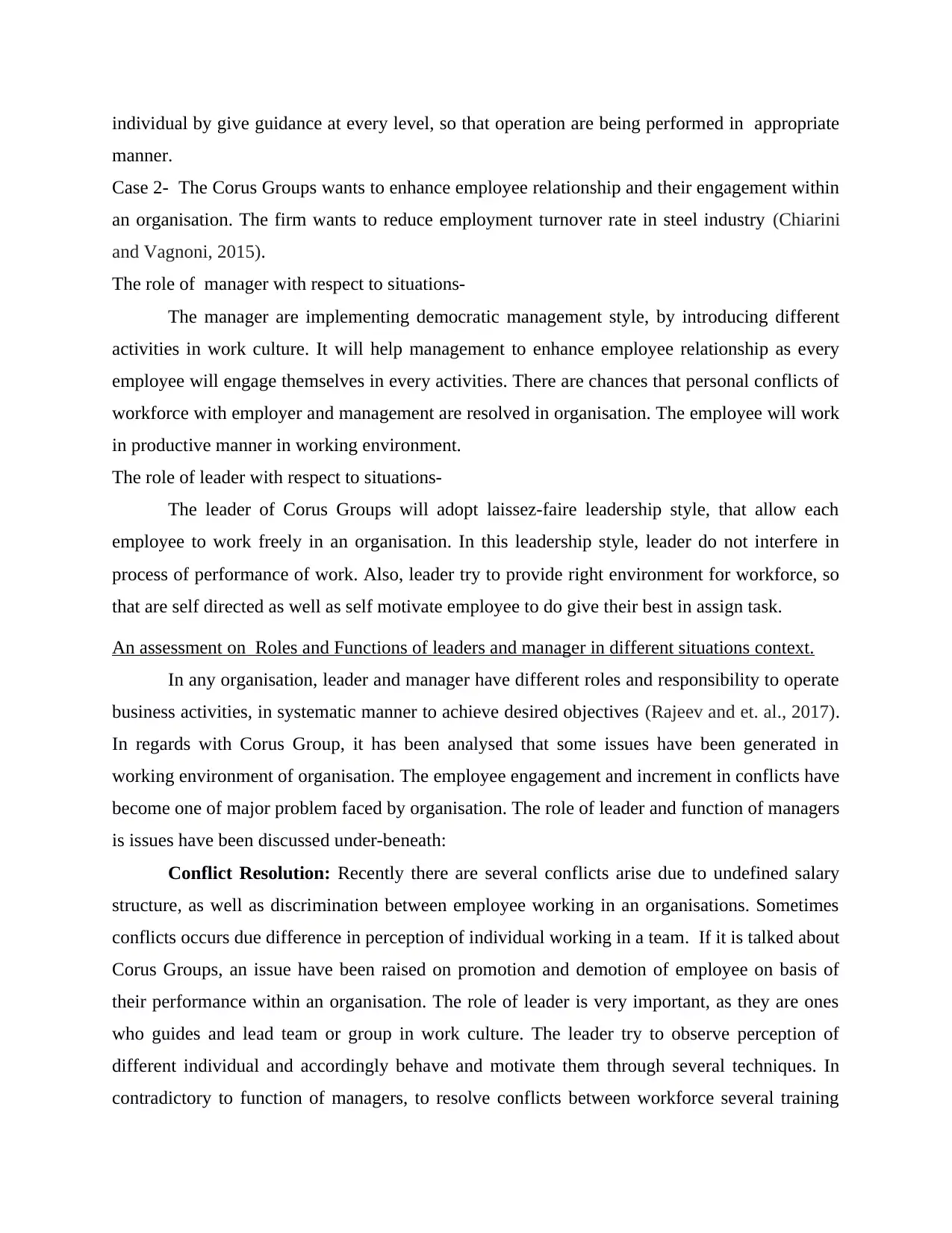
individual by give guidance at every level, so that operation are being performed in appropriate
manner.
Case 2- The Corus Groups wants to enhance employee relationship and their engagement within
an organisation. The firm wants to reduce employment turnover rate in steel industry (Chiarini
and Vagnoni, 2015).
The role of manager with respect to situations-
The manager are implementing democratic management style, by introducing different
activities in work culture. It will help management to enhance employee relationship as every
employee will engage themselves in every activities. There are chances that personal conflicts of
workforce with employer and management are resolved in organisation. The employee will work
in productive manner in working environment.
The role of leader with respect to situations-
The leader of Corus Groups will adopt laissez-faire leadership style, that allow each
employee to work freely in an organisation. In this leadership style, leader do not interfere in
process of performance of work. Also, leader try to provide right environment for workforce, so
that are self directed as well as self motivate employee to do give their best in assign task.
An assessment on Roles and Functions of leaders and manager in different situations context.
In any organisation, leader and manager have different roles and responsibility to operate
business activities, in systematic manner to achieve desired objectives (Rajeev and et. al., 2017).
In regards with Corus Group, it has been analysed that some issues have been generated in
working environment of organisation. The employee engagement and increment in conflicts have
become one of major problem faced by organisation. The role of leader and function of managers
is issues have been discussed under-beneath:
Conflict Resolution: Recently there are several conflicts arise due to undefined salary
structure, as well as discrimination between employee working in an organisations. Sometimes
conflicts occurs due difference in perception of individual working in a team. If it is talked about
Corus Groups, an issue have been raised on promotion and demotion of employee on basis of
their performance within an organisation. The role of leader is very important, as they are ones
who guides and lead team or group in work culture. The leader try to observe perception of
different individual and accordingly behave and motivate them through several techniques. In
contradictory to function of managers, to resolve conflicts between workforce several training
manner.
Case 2- The Corus Groups wants to enhance employee relationship and their engagement within
an organisation. The firm wants to reduce employment turnover rate in steel industry (Chiarini
and Vagnoni, 2015).
The role of manager with respect to situations-
The manager are implementing democratic management style, by introducing different
activities in work culture. It will help management to enhance employee relationship as every
employee will engage themselves in every activities. There are chances that personal conflicts of
workforce with employer and management are resolved in organisation. The employee will work
in productive manner in working environment.
The role of leader with respect to situations-
The leader of Corus Groups will adopt laissez-faire leadership style, that allow each
employee to work freely in an organisation. In this leadership style, leader do not interfere in
process of performance of work. Also, leader try to provide right environment for workforce, so
that are self directed as well as self motivate employee to do give their best in assign task.
An assessment on Roles and Functions of leaders and manager in different situations context.
In any organisation, leader and manager have different roles and responsibility to operate
business activities, in systematic manner to achieve desired objectives (Rajeev and et. al., 2017).
In regards with Corus Group, it has been analysed that some issues have been generated in
working environment of organisation. The employee engagement and increment in conflicts have
become one of major problem faced by organisation. The role of leader and function of managers
is issues have been discussed under-beneath:
Conflict Resolution: Recently there are several conflicts arise due to undefined salary
structure, as well as discrimination between employee working in an organisations. Sometimes
conflicts occurs due difference in perception of individual working in a team. If it is talked about
Corus Groups, an issue have been raised on promotion and demotion of employee on basis of
their performance within an organisation. The role of leader is very important, as they are ones
who guides and lead team or group in work culture. The leader try to observe perception of
different individual and accordingly behave and motivate them through several techniques. In
contradictory to function of managers, to resolve conflicts between workforce several training
⊘ This is a preview!⊘
Do you want full access?
Subscribe today to unlock all pages.

Trusted by 1+ million students worldwide
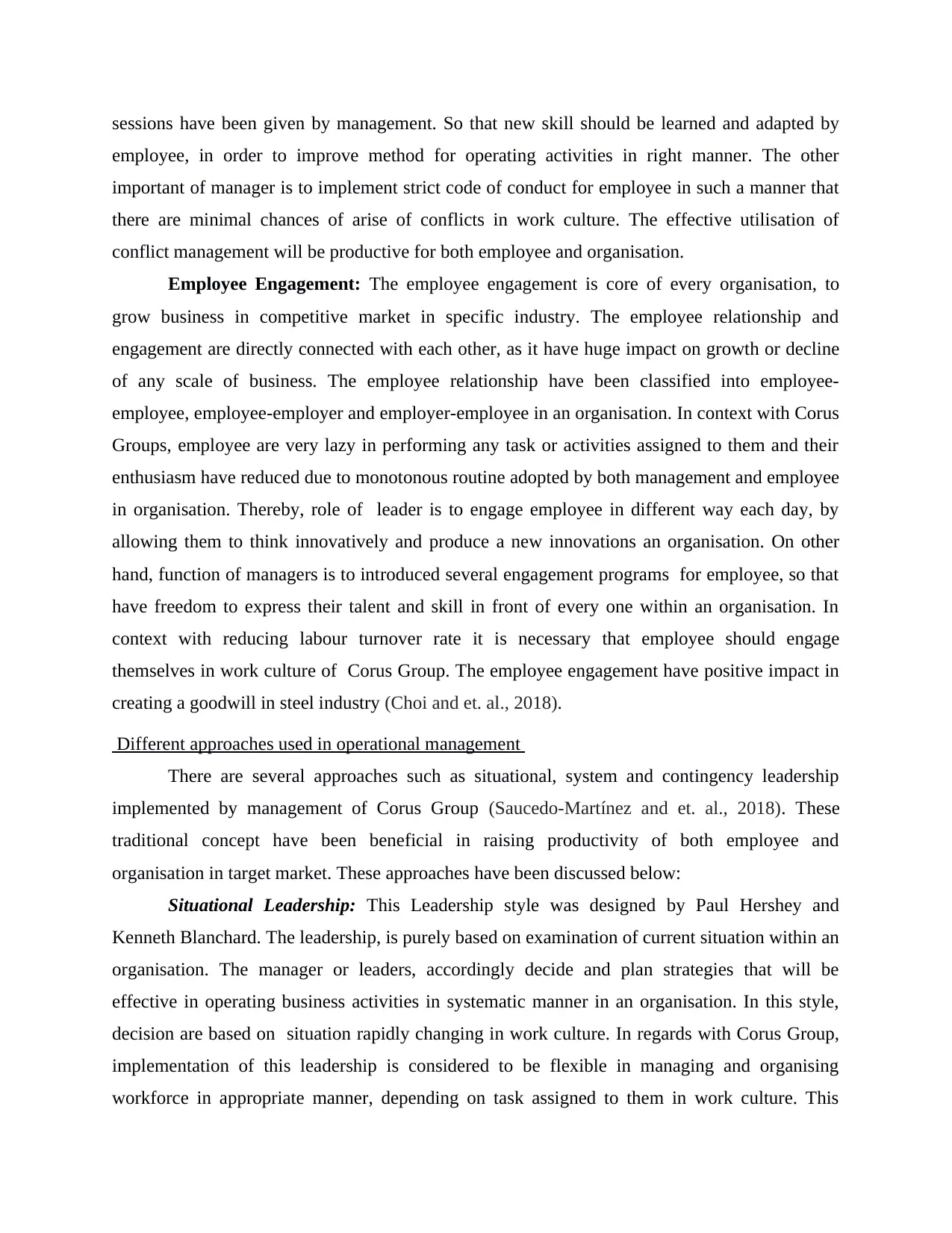
sessions have been given by management. So that new skill should be learned and adapted by
employee, in order to improve method for operating activities in right manner. The other
important of manager is to implement strict code of conduct for employee in such a manner that
there are minimal chances of arise of conflicts in work culture. The effective utilisation of
conflict management will be productive for both employee and organisation.
Employee Engagement: The employee engagement is core of every organisation, to
grow business in competitive market in specific industry. The employee relationship and
engagement are directly connected with each other, as it have huge impact on growth or decline
of any scale of business. The employee relationship have been classified into employee-
employee, employee-employer and employer-employee in an organisation. In context with Corus
Groups, employee are very lazy in performing any task or activities assigned to them and their
enthusiasm have reduced due to monotonous routine adopted by both management and employee
in organisation. Thereby, role of leader is to engage employee in different way each day, by
allowing them to think innovatively and produce a new innovations an organisation. On other
hand, function of managers is to introduced several engagement programs for employee, so that
have freedom to express their talent and skill in front of every one within an organisation. In
context with reducing labour turnover rate it is necessary that employee should engage
themselves in work culture of Corus Group. The employee engagement have positive impact in
creating a goodwill in steel industry (Choi and et. al., 2018).
Different approaches used in operational management
There are several approaches such as situational, system and contingency leadership
implemented by management of Corus Group (Saucedo-Martínez and et. al., 2018). These
traditional concept have been beneficial in raising productivity of both employee and
organisation in target market. These approaches have been discussed below:
Situational Leadership: This Leadership style was designed by Paul Hershey and
Kenneth Blanchard. The leadership, is purely based on examination of current situation within an
organisation. The manager or leaders, accordingly decide and plan strategies that will be
effective in operating business activities in systematic manner in an organisation. In this style,
decision are based on situation rapidly changing in work culture. In regards with Corus Group,
implementation of this leadership is considered to be flexible in managing and organising
workforce in appropriate manner, depending on task assigned to them in work culture. This
employee, in order to improve method for operating activities in right manner. The other
important of manager is to implement strict code of conduct for employee in such a manner that
there are minimal chances of arise of conflicts in work culture. The effective utilisation of
conflict management will be productive for both employee and organisation.
Employee Engagement: The employee engagement is core of every organisation, to
grow business in competitive market in specific industry. The employee relationship and
engagement are directly connected with each other, as it have huge impact on growth or decline
of any scale of business. The employee relationship have been classified into employee-
employee, employee-employer and employer-employee in an organisation. In context with Corus
Groups, employee are very lazy in performing any task or activities assigned to them and their
enthusiasm have reduced due to monotonous routine adopted by both management and employee
in organisation. Thereby, role of leader is to engage employee in different way each day, by
allowing them to think innovatively and produce a new innovations an organisation. On other
hand, function of managers is to introduced several engagement programs for employee, so that
have freedom to express their talent and skill in front of every one within an organisation. In
context with reducing labour turnover rate it is necessary that employee should engage
themselves in work culture of Corus Group. The employee engagement have positive impact in
creating a goodwill in steel industry (Choi and et. al., 2018).
Different approaches used in operational management
There are several approaches such as situational, system and contingency leadership
implemented by management of Corus Group (Saucedo-Martínez and et. al., 2018). These
traditional concept have been beneficial in raising productivity of both employee and
organisation in target market. These approaches have been discussed below:
Situational Leadership: This Leadership style was designed by Paul Hershey and
Kenneth Blanchard. The leadership, is purely based on examination of current situation within an
organisation. The manager or leaders, accordingly decide and plan strategies that will be
effective in operating business activities in systematic manner in an organisation. In this style,
decision are based on situation rapidly changing in work culture. In regards with Corus Group,
implementation of this leadership is considered to be flexible in managing and organising
workforce in appropriate manner, depending on task assigned to them in work culture. This
Paraphrase This Document
Need a fresh take? Get an instant paraphrase of this document with our AI Paraphraser
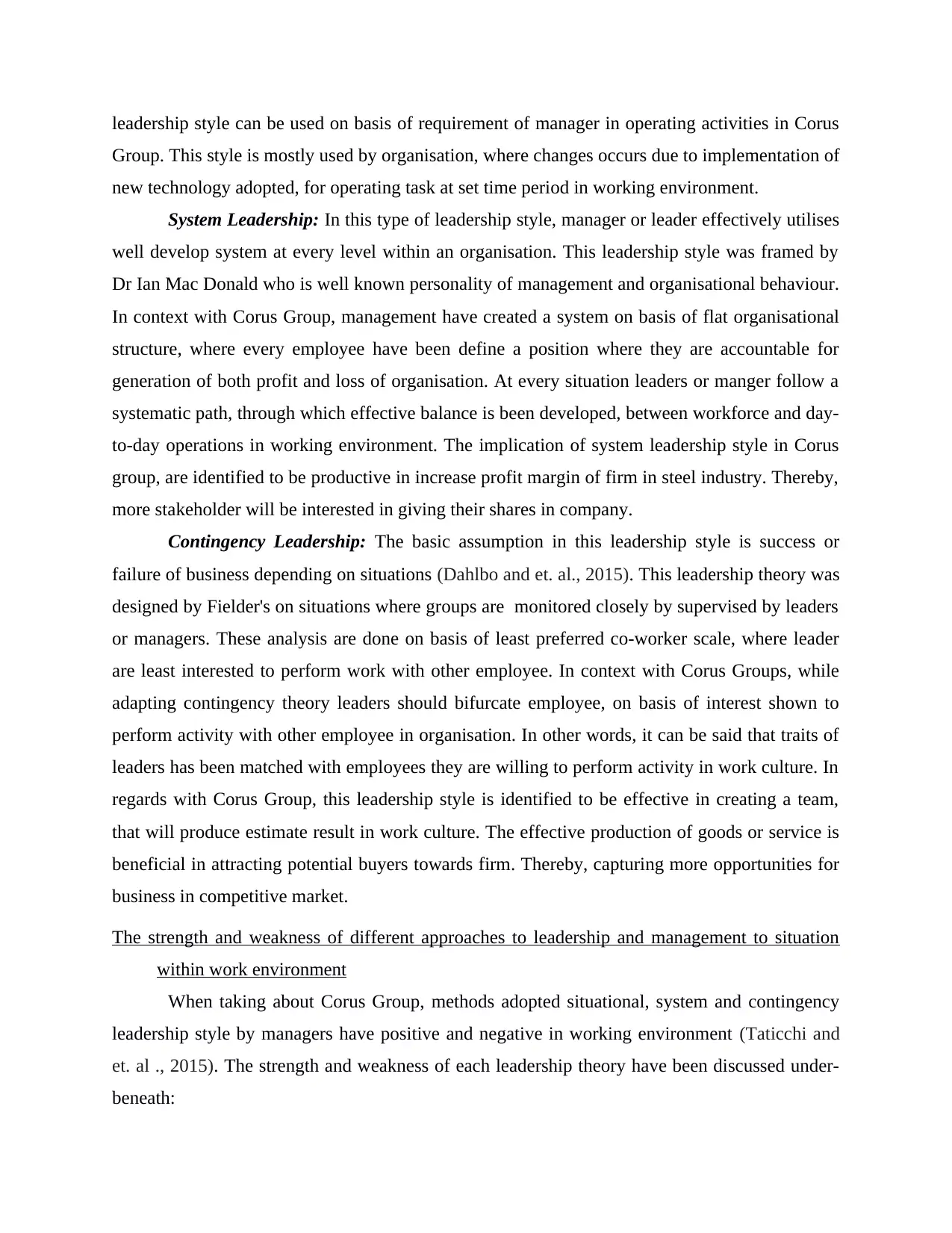
leadership style can be used on basis of requirement of manager in operating activities in Corus
Group. This style is mostly used by organisation, where changes occurs due to implementation of
new technology adopted, for operating task at set time period in working environment.
System Leadership: In this type of leadership style, manager or leader effectively utilises
well develop system at every level within an organisation. This leadership style was framed by
Dr Ian Mac Donald who is well known personality of management and organisational behaviour.
In context with Corus Group, management have created a system on basis of flat organisational
structure, where every employee have been define a position where they are accountable for
generation of both profit and loss of organisation. At every situation leaders or manger follow a
systematic path, through which effective balance is been developed, between workforce and day-
to-day operations in working environment. The implication of system leadership style in Corus
group, are identified to be productive in increase profit margin of firm in steel industry. Thereby,
more stakeholder will be interested in giving their shares in company.
Contingency Leadership: The basic assumption in this leadership style is success or
failure of business depending on situations (Dahlbo and et. al., 2015). This leadership theory was
designed by Fielder's on situations where groups are monitored closely by supervised by leaders
or managers. These analysis are done on basis of least preferred co-worker scale, where leader
are least interested to perform work with other employee. In context with Corus Groups, while
adapting contingency theory leaders should bifurcate employee, on basis of interest shown to
perform activity with other employee in organisation. In other words, it can be said that traits of
leaders has been matched with employees they are willing to perform activity in work culture. In
regards with Corus Group, this leadership style is identified to be effective in creating a team,
that will produce estimate result in work culture. The effective production of goods or service is
beneficial in attracting potential buyers towards firm. Thereby, capturing more opportunities for
business in competitive market.
The strength and weakness of different approaches to leadership and management to situation
within work environment
When taking about Corus Group, methods adopted situational, system and contingency
leadership style by managers have positive and negative in working environment (Taticchi and
et. al ., 2015). The strength and weakness of each leadership theory have been discussed under-
beneath:
Group. This style is mostly used by organisation, where changes occurs due to implementation of
new technology adopted, for operating task at set time period in working environment.
System Leadership: In this type of leadership style, manager or leader effectively utilises
well develop system at every level within an organisation. This leadership style was framed by
Dr Ian Mac Donald who is well known personality of management and organisational behaviour.
In context with Corus Group, management have created a system on basis of flat organisational
structure, where every employee have been define a position where they are accountable for
generation of both profit and loss of organisation. At every situation leaders or manger follow a
systematic path, through which effective balance is been developed, between workforce and day-
to-day operations in working environment. The implication of system leadership style in Corus
group, are identified to be productive in increase profit margin of firm in steel industry. Thereby,
more stakeholder will be interested in giving their shares in company.
Contingency Leadership: The basic assumption in this leadership style is success or
failure of business depending on situations (Dahlbo and et. al., 2015). This leadership theory was
designed by Fielder's on situations where groups are monitored closely by supervised by leaders
or managers. These analysis are done on basis of least preferred co-worker scale, where leader
are least interested to perform work with other employee. In context with Corus Groups, while
adapting contingency theory leaders should bifurcate employee, on basis of interest shown to
perform activity with other employee in organisation. In other words, it can be said that traits of
leaders has been matched with employees they are willing to perform activity in work culture. In
regards with Corus Group, this leadership style is identified to be effective in creating a team,
that will produce estimate result in work culture. The effective production of goods or service is
beneficial in attracting potential buyers towards firm. Thereby, capturing more opportunities for
business in competitive market.
The strength and weakness of different approaches to leadership and management to situation
within work environment
When taking about Corus Group, methods adopted situational, system and contingency
leadership style by managers have positive and negative in working environment (Taticchi and
et. al ., 2015). The strength and weakness of each leadership theory have been discussed under-
beneath:
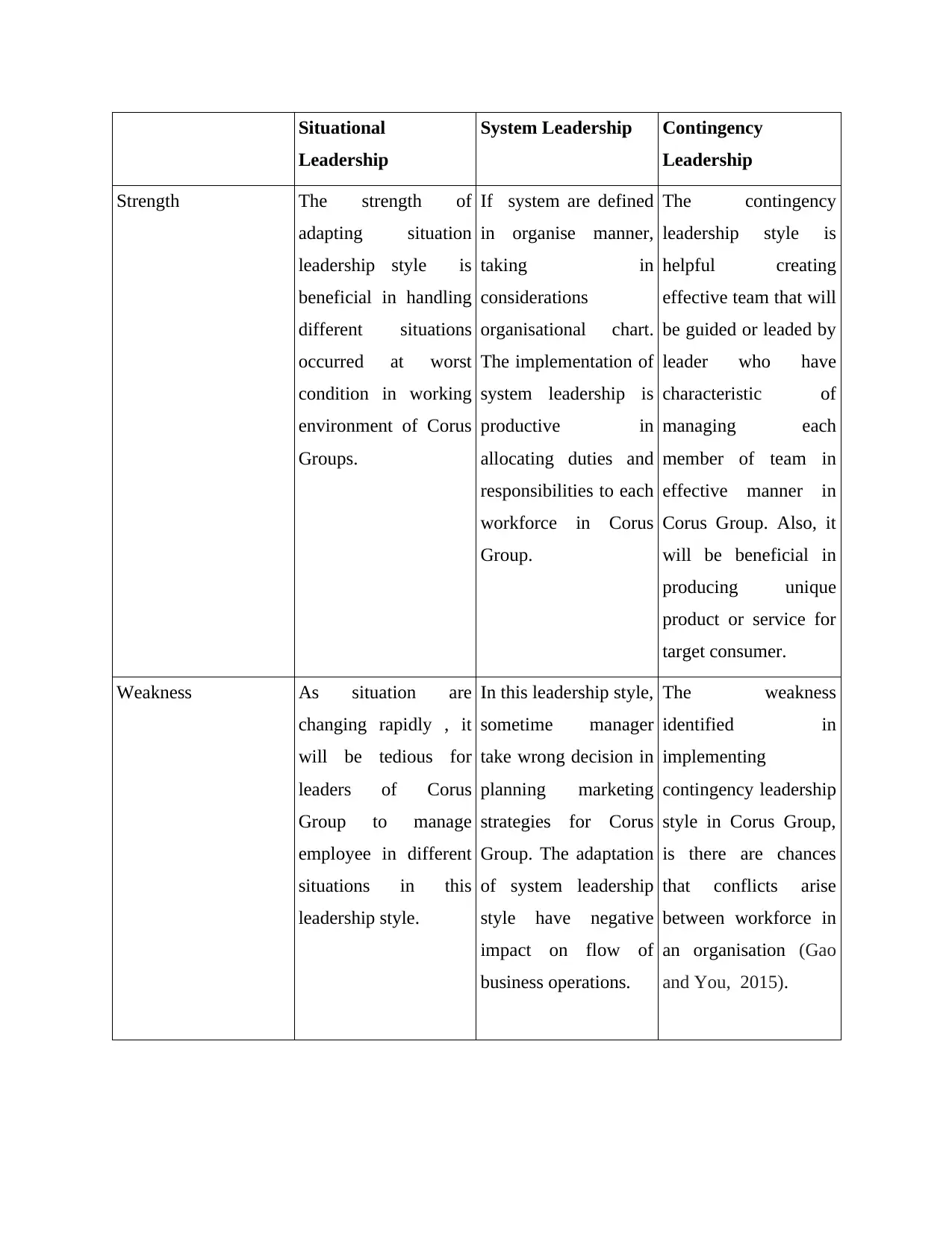
Situational
Leadership
System Leadership Contingency
Leadership
Strength The strength of
adapting situation
leadership style is
beneficial in handling
different situations
occurred at worst
condition in working
environment of Corus
Groups.
If system are defined
in organise manner,
taking in
considerations
organisational chart.
The implementation of
system leadership is
productive in
allocating duties and
responsibilities to each
workforce in Corus
Group.
The contingency
leadership style is
helpful creating
effective team that will
be guided or leaded by
leader who have
characteristic of
managing each
member of team in
effective manner in
Corus Group. Also, it
will be beneficial in
producing unique
product or service for
target consumer.
Weakness As situation are
changing rapidly , it
will be tedious for
leaders of Corus
Group to manage
employee in different
situations in this
leadership style.
In this leadership style,
sometime manager
take wrong decision in
planning marketing
strategies for Corus
Group. The adaptation
of system leadership
style have negative
impact on flow of
business operations.
The weakness
identified in
implementing
contingency leadership
style in Corus Group,
is there are chances
that conflicts arise
between workforce in
an organisation (Gao
and You, 2015).
Leadership
System Leadership Contingency
Leadership
Strength The strength of
adapting situation
leadership style is
beneficial in handling
different situations
occurred at worst
condition in working
environment of Corus
Groups.
If system are defined
in organise manner,
taking in
considerations
organisational chart.
The implementation of
system leadership is
productive in
allocating duties and
responsibilities to each
workforce in Corus
Group.
The contingency
leadership style is
helpful creating
effective team that will
be guided or leaded by
leader who have
characteristic of
managing each
member of team in
effective manner in
Corus Group. Also, it
will be beneficial in
producing unique
product or service for
target consumer.
Weakness As situation are
changing rapidly , it
will be tedious for
leaders of Corus
Group to manage
employee in different
situations in this
leadership style.
In this leadership style,
sometime manager
take wrong decision in
planning marketing
strategies for Corus
Group. The adaptation
of system leadership
style have negative
impact on flow of
business operations.
The weakness
identified in
implementing
contingency leadership
style in Corus Group,
is there are chances
that conflicts arise
between workforce in
an organisation (Gao
and You, 2015).
⊘ This is a preview!⊘
Do you want full access?
Subscribe today to unlock all pages.

Trusted by 1+ million students worldwide
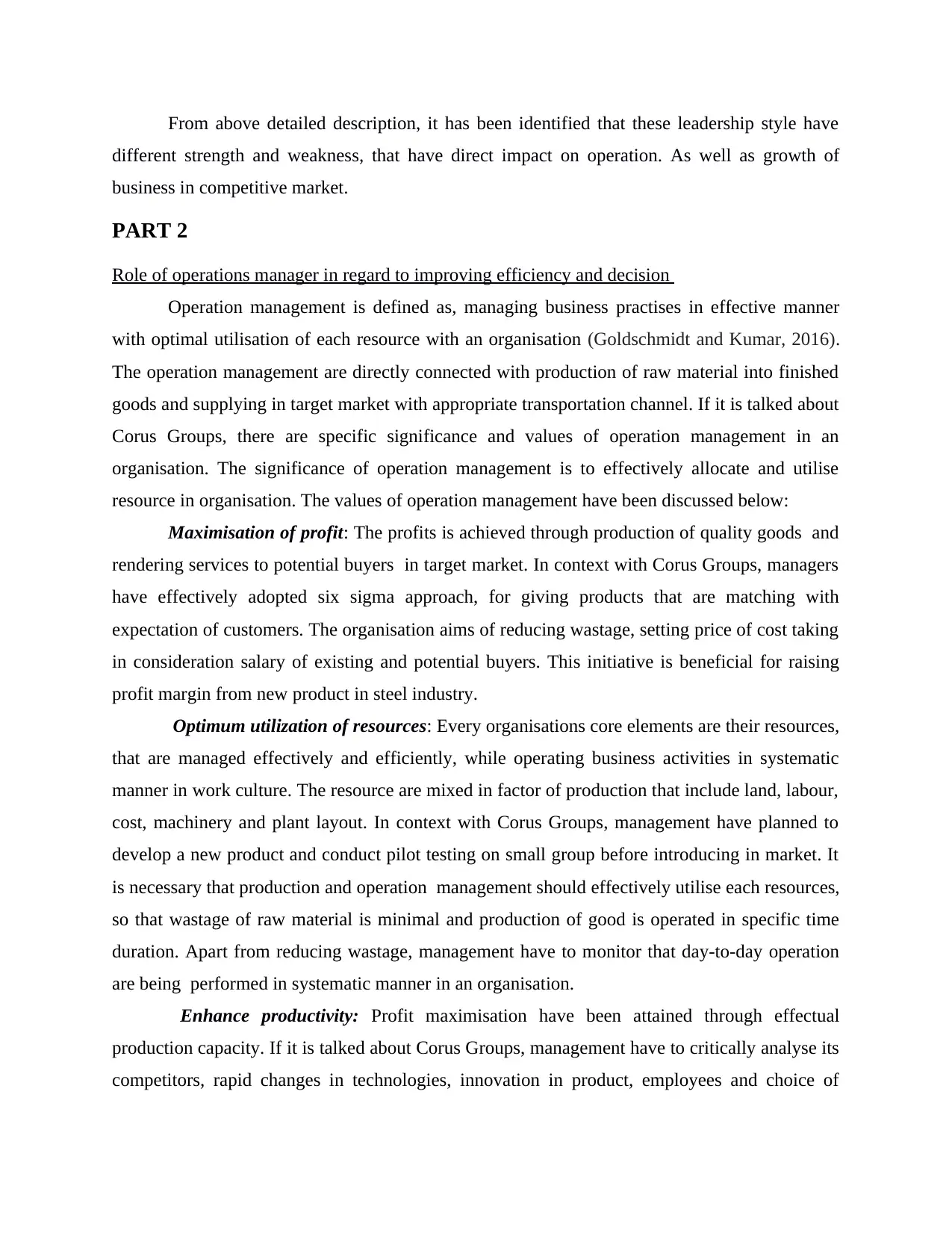
From above detailed description, it has been identified that these leadership style have
different strength and weakness, that have direct impact on operation. As well as growth of
business in competitive market.
PART 2
Role of operations manager in regard to improving efficiency and decision
Operation management is defined as, managing business practises in effective manner
with optimal utilisation of each resource with an organisation (Goldschmidt and Kumar, 2016).
The operation management are directly connected with production of raw material into finished
goods and supplying in target market with appropriate transportation channel. If it is talked about
Corus Groups, there are specific significance and values of operation management in an
organisation. The significance of operation management is to effectively allocate and utilise
resource in organisation. The values of operation management have been discussed below:
Maximisation of profit: The profits is achieved through production of quality goods and
rendering services to potential buyers in target market. In context with Corus Groups, managers
have effectively adopted six sigma approach, for giving products that are matching with
expectation of customers. The organisation aims of reducing wastage, setting price of cost taking
in consideration salary of existing and potential buyers. This initiative is beneficial for raising
profit margin from new product in steel industry.
Optimum utilization of resources: Every organisations core elements are their resources,
that are managed effectively and efficiently, while operating business activities in systematic
manner in work culture. The resource are mixed in factor of production that include land, labour,
cost, machinery and plant layout. In context with Corus Groups, management have planned to
develop a new product and conduct pilot testing on small group before introducing in market. It
is necessary that production and operation management should effectively utilise each resources,
so that wastage of raw material is minimal and production of good is operated in specific time
duration. Apart from reducing wastage, management have to monitor that day-to-day operation
are being performed in systematic manner in an organisation.
Enhance productivity: Profit maximisation have been attained through effectual
production capacity. If it is talked about Corus Groups, management have to critically analyse its
competitors, rapid changes in technologies, innovation in product, employees and choice of
different strength and weakness, that have direct impact on operation. As well as growth of
business in competitive market.
PART 2
Role of operations manager in regard to improving efficiency and decision
Operation management is defined as, managing business practises in effective manner
with optimal utilisation of each resource with an organisation (Goldschmidt and Kumar, 2016).
The operation management are directly connected with production of raw material into finished
goods and supplying in target market with appropriate transportation channel. If it is talked about
Corus Groups, there are specific significance and values of operation management in an
organisation. The significance of operation management is to effectively allocate and utilise
resource in organisation. The values of operation management have been discussed below:
Maximisation of profit: The profits is achieved through production of quality goods and
rendering services to potential buyers in target market. In context with Corus Groups, managers
have effectively adopted six sigma approach, for giving products that are matching with
expectation of customers. The organisation aims of reducing wastage, setting price of cost taking
in consideration salary of existing and potential buyers. This initiative is beneficial for raising
profit margin from new product in steel industry.
Optimum utilization of resources: Every organisations core elements are their resources,
that are managed effectively and efficiently, while operating business activities in systematic
manner in work culture. The resource are mixed in factor of production that include land, labour,
cost, machinery and plant layout. In context with Corus Groups, management have planned to
develop a new product and conduct pilot testing on small group before introducing in market. It
is necessary that production and operation management should effectively utilise each resources,
so that wastage of raw material is minimal and production of good is operated in specific time
duration. Apart from reducing wastage, management have to monitor that day-to-day operation
are being performed in systematic manner in an organisation.
Enhance productivity: Profit maximisation have been attained through effectual
production capacity. If it is talked about Corus Groups, management have to critically analyse its
competitors, rapid changes in technologies, innovation in product, employees and choice of
Paraphrase This Document
Need a fresh take? Get an instant paraphrase of this document with our AI Paraphraser
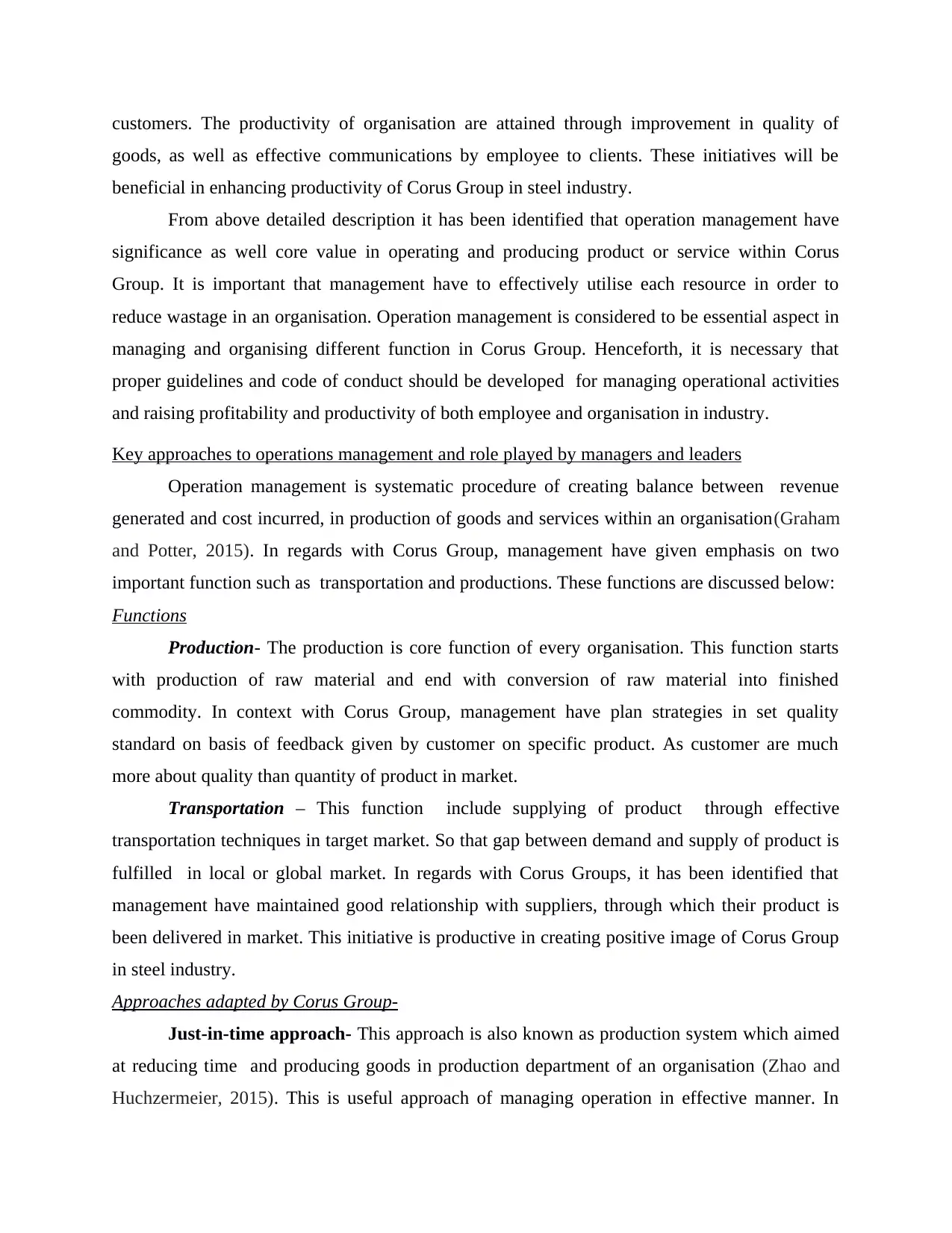
customers. The productivity of organisation are attained through improvement in quality of
goods, as well as effective communications by employee to clients. These initiatives will be
beneficial in enhancing productivity of Corus Group in steel industry.
From above detailed description it has been identified that operation management have
significance as well core value in operating and producing product or service within Corus
Group. It is important that management have to effectively utilise each resource in order to
reduce wastage in an organisation. Operation management is considered to be essential aspect in
managing and organising different function in Corus Group. Henceforth, it is necessary that
proper guidelines and code of conduct should be developed for managing operational activities
and raising profitability and productivity of both employee and organisation in industry.
Key approaches to operations management and role played by managers and leaders
Operation management is systematic procedure of creating balance between revenue
generated and cost incurred, in production of goods and services within an organisation(Graham
and Potter, 2015). In regards with Corus Group, management have given emphasis on two
important function such as transportation and productions. These functions are discussed below:
Functions
Production- The production is core function of every organisation. This function starts
with production of raw material and end with conversion of raw material into finished
commodity. In context with Corus Group, management have plan strategies in set quality
standard on basis of feedback given by customer on specific product. As customer are much
more about quality than quantity of product in market.
Transportation – This function include supplying of product through effective
transportation techniques in target market. So that gap between demand and supply of product is
fulfilled in local or global market. In regards with Corus Groups, it has been identified that
management have maintained good relationship with suppliers, through which their product is
been delivered in market. This initiative is productive in creating positive image of Corus Group
in steel industry.
Approaches adapted by Corus Group-
Just-in-time approach- This approach is also known as production system which aimed
at reducing time and producing goods in production department of an organisation (Zhao and
Huchzermeier, 2015). This is useful approach of managing operation in effective manner. In
goods, as well as effective communications by employee to clients. These initiatives will be
beneficial in enhancing productivity of Corus Group in steel industry.
From above detailed description it has been identified that operation management have
significance as well core value in operating and producing product or service within Corus
Group. It is important that management have to effectively utilise each resource in order to
reduce wastage in an organisation. Operation management is considered to be essential aspect in
managing and organising different function in Corus Group. Henceforth, it is necessary that
proper guidelines and code of conduct should be developed for managing operational activities
and raising profitability and productivity of both employee and organisation in industry.
Key approaches to operations management and role played by managers and leaders
Operation management is systematic procedure of creating balance between revenue
generated and cost incurred, in production of goods and services within an organisation(Graham
and Potter, 2015). In regards with Corus Group, management have given emphasis on two
important function such as transportation and productions. These functions are discussed below:
Functions
Production- The production is core function of every organisation. This function starts
with production of raw material and end with conversion of raw material into finished
commodity. In context with Corus Group, management have plan strategies in set quality
standard on basis of feedback given by customer on specific product. As customer are much
more about quality than quantity of product in market.
Transportation – This function include supplying of product through effective
transportation techniques in target market. So that gap between demand and supply of product is
fulfilled in local or global market. In regards with Corus Groups, it has been identified that
management have maintained good relationship with suppliers, through which their product is
been delivered in market. This initiative is productive in creating positive image of Corus Group
in steel industry.
Approaches adapted by Corus Group-
Just-in-time approach- This approach is also known as production system which aimed
at reducing time and producing goods in production department of an organisation (Zhao and
Huchzermeier, 2015). This is useful approach of managing operation in effective manner. In
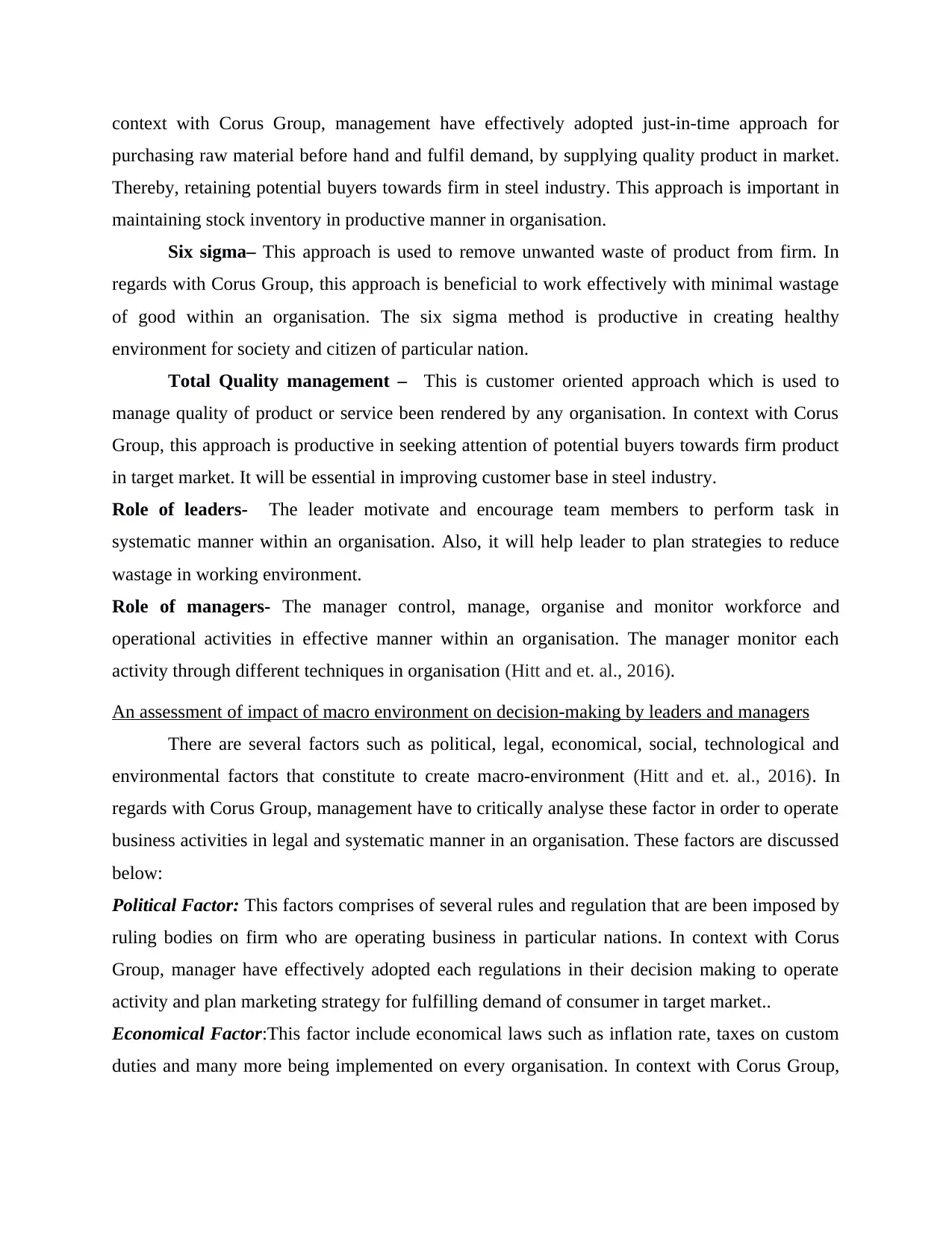
context with Corus Group, management have effectively adopted just-in-time approach for
purchasing raw material before hand and fulfil demand, by supplying quality product in market.
Thereby, retaining potential buyers towards firm in steel industry. This approach is important in
maintaining stock inventory in productive manner in organisation.
Six sigma– This approach is used to remove unwanted waste of product from firm. In
regards with Corus Group, this approach is beneficial to work effectively with minimal wastage
of good within an organisation. The six sigma method is productive in creating healthy
environment for society and citizen of particular nation.
Total Quality management – This is customer oriented approach which is used to
manage quality of product or service been rendered by any organisation. In context with Corus
Group, this approach is productive in seeking attention of potential buyers towards firm product
in target market. It will be essential in improving customer base in steel industry.
Role of leaders- The leader motivate and encourage team members to perform task in
systematic manner within an organisation. Also, it will help leader to plan strategies to reduce
wastage in working environment.
Role of managers- The manager control, manage, organise and monitor workforce and
operational activities in effective manner within an organisation. The manager monitor each
activity through different techniques in organisation (Hitt and et. al., 2016).
An assessment of impact of macro environment on decision-making by leaders and managers
There are several factors such as political, legal, economical, social, technological and
environmental factors that constitute to create macro-environment (Hitt and et. al., 2016). In
regards with Corus Group, management have to critically analyse these factor in order to operate
business activities in legal and systematic manner in an organisation. These factors are discussed
below:
Political Factor: This factors comprises of several rules and regulation that are been imposed by
ruling bodies on firm who are operating business in particular nations. In context with Corus
Group, manager have effectively adopted each regulations in their decision making to operate
activity and plan marketing strategy for fulfilling demand of consumer in target market..
Economical Factor:This factor include economical laws such as inflation rate, taxes on custom
duties and many more being implemented on every organisation. In context with Corus Group,
purchasing raw material before hand and fulfil demand, by supplying quality product in market.
Thereby, retaining potential buyers towards firm in steel industry. This approach is important in
maintaining stock inventory in productive manner in organisation.
Six sigma– This approach is used to remove unwanted waste of product from firm. In
regards with Corus Group, this approach is beneficial to work effectively with minimal wastage
of good within an organisation. The six sigma method is productive in creating healthy
environment for society and citizen of particular nation.
Total Quality management – This is customer oriented approach which is used to
manage quality of product or service been rendered by any organisation. In context with Corus
Group, this approach is productive in seeking attention of potential buyers towards firm product
in target market. It will be essential in improving customer base in steel industry.
Role of leaders- The leader motivate and encourage team members to perform task in
systematic manner within an organisation. Also, it will help leader to plan strategies to reduce
wastage in working environment.
Role of managers- The manager control, manage, organise and monitor workforce and
operational activities in effective manner within an organisation. The manager monitor each
activity through different techniques in organisation (Hitt and et. al., 2016).
An assessment of impact of macro environment on decision-making by leaders and managers
There are several factors such as political, legal, economical, social, technological and
environmental factors that constitute to create macro-environment (Hitt and et. al., 2016). In
regards with Corus Group, management have to critically analyse these factor in order to operate
business activities in legal and systematic manner in an organisation. These factors are discussed
below:
Political Factor: This factors comprises of several rules and regulation that are been imposed by
ruling bodies on firm who are operating business in particular nations. In context with Corus
Group, manager have effectively adopted each regulations in their decision making to operate
activity and plan marketing strategy for fulfilling demand of consumer in target market..
Economical Factor:This factor include economical laws such as inflation rate, taxes on custom
duties and many more being implemented on every organisation. In context with Corus Group,
⊘ This is a preview!⊘
Do you want full access?
Subscribe today to unlock all pages.

Trusted by 1+ million students worldwide
1 out of 16
Related Documents
Your All-in-One AI-Powered Toolkit for Academic Success.
+13062052269
info@desklib.com
Available 24*7 on WhatsApp / Email
![[object Object]](/_next/static/media/star-bottom.7253800d.svg)
Unlock your academic potential
Copyright © 2020–2026 A2Z Services. All Rights Reserved. Developed and managed by ZUCOL.





